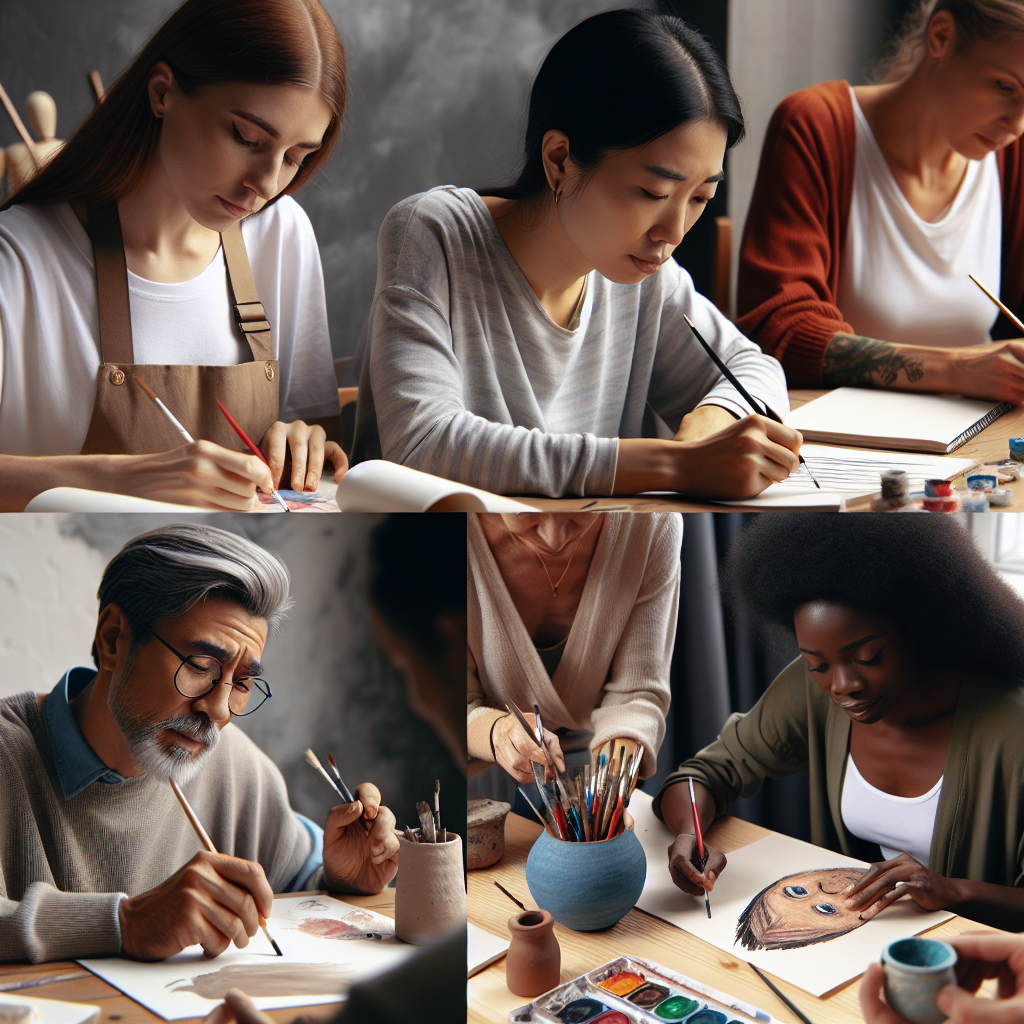-
Table of Contents

“Unlock Healing Through Creativity: Art Therapy in Addiction Recovery”
Introduction
Art therapy is an innovative and effective approach to addiction recovery that leverages the creative process to help individuals express themselves, explore their emotions, and develop coping mechanisms. By engaging in various forms of artistic expression such as painting, drawing, sculpture, and other visual arts, individuals struggling with addiction can access and articulate feelings that may be difficult to verbalize. This therapeutic modality not only provides a non-verbal outlet for emotions but also fosters self-awareness, reduces stress, and enhances overall mental health. Through the guidance of trained art therapists, participants can gain insights into their addiction, uncover underlying issues, and build resilience, ultimately supporting their journey towards lasting recovery.
The Role of Art Therapy in Healing Emotional Trauma During Addiction Recovery
Art therapy has emerged as a powerful tool in the realm of addiction recovery, offering a unique avenue for healing emotional trauma. This therapeutic approach leverages the creative process to help individuals express and understand their emotions, which is particularly beneficial for those grappling with addiction. The journey to recovery is often fraught with emotional turmoil, and traditional talk therapies may not always suffice in addressing the deep-seated issues that contribute to substance abuse. Here, art therapy steps in, providing a non-verbal outlet for expression and a pathway to emotional healing.
One of the most significant benefits of art therapy in addiction recovery is its ability to bypass the limitations of language. Many individuals struggling with addiction find it challenging to articulate their feelings and experiences. Art therapy allows them to convey complex emotions through visual means, such as drawing, painting, or sculpting. This form of expression can be incredibly liberating, as it enables individuals to externalize their inner turmoil in a tangible form. Consequently, they can begin to process and understand their emotions more effectively, paving the way for deeper healing.
Moreover, art therapy fosters a sense of self-awareness and self-discovery. As individuals engage in the creative process, they often uncover hidden aspects of themselves and their experiences. This newfound awareness can be instrumental in identifying the root causes of their addiction. For instance, a person might realize that their substance abuse is a coping mechanism for unresolved trauma or emotional pain. By bringing these issues to light, art therapy empowers individuals to address them head-on, rather than resorting to harmful behaviors.
In addition to promoting self-awareness, art therapy also enhances emotional regulation. The act of creating art can be a soothing and meditative experience, helping individuals to manage stress and anxiety. This is particularly important in addiction recovery, as high levels of stress and emotional dysregulation are common triggers for relapse. Through art therapy, individuals can develop healthier coping mechanisms and learn to navigate their emotions more effectively. This, in turn, strengthens their resilience and reduces the likelihood of returning to substance use.
Furthermore, art therapy can help to rebuild a sense of identity and self-worth. Addiction often strips individuals of their self-esteem and leaves them feeling disconnected from their true selves. Engaging in creative activities allows them to reconnect with their passions and interests, fostering a renewed sense of purpose. As they create and accomplish artistic projects, they experience a sense of achievement and pride, which can be incredibly empowering. This boost in self-esteem is crucial for sustaining long-term recovery and building a fulfilling, substance-free life.
Another vital aspect of art therapy is its ability to facilitate communication and connection. In group settings, art therapy can create a supportive community where individuals feel understood and validated. Sharing their artwork and the stories behind it can foster a sense of camaraderie and mutual support. This sense of belonging is essential for recovery, as it helps individuals to feel less isolated and more connected to others who share similar struggles.
In conclusion, art therapy plays a pivotal role in healing emotional trauma during addiction recovery. By providing a non-verbal outlet for expression, fostering self-awareness, enhancing emotional regulation, rebuilding self-worth, and facilitating connection, art therapy offers a holistic approach to recovery. It empowers individuals to confront and heal their emotional wounds, ultimately paving the way for a healthier, more fulfilling life. As more people discover the transformative power of art therapy, it continues to gain recognition as a valuable component of comprehensive addiction treatment programs.
Creative Expression: How Art Therapy Facilitates Personal Growth in Addiction Recovery
Art therapy has emerged as a powerful tool in the realm of addiction recovery, offering individuals a unique avenue for personal growth and healing. This therapeutic approach leverages the creative process to help individuals express emotions, confront underlying issues, and develop coping mechanisms. By engaging in artistic activities, those in recovery can explore their inner worlds in a non-verbal, non-judgmental space, which can be particularly beneficial for those who find it challenging to articulate their feelings through words alone.
One of the most significant benefits of art therapy in addiction recovery is its ability to facilitate emotional expression. Many individuals struggling with addiction have repressed emotions or traumatic experiences that they find difficult to confront. Through the act of creating art, whether it be painting, drawing, sculpting, or any other form, individuals can externalize these emotions in a tangible way. This process not only provides a sense of relief but also allows for a deeper understanding of one’s emotional landscape. As a result, individuals can begin to address the root causes of their addiction, paving the way for more effective and lasting recovery.
Moreover, art therapy encourages self-reflection and self-discovery. The creative process often leads individuals to uncover aspects of themselves that they may not have been aware of. This newfound self-awareness can be incredibly empowering, as it enables individuals to recognize their strengths and weaknesses. By understanding these facets of their personality, they can develop healthier coping strategies and make more informed decisions about their recovery journey. Additionally, the sense of accomplishment that comes from creating a piece of art can boost self-esteem and provide a much-needed sense of purpose and direction.
Transitioning from emotional expression to cognitive benefits, art therapy also enhances problem-solving skills and cognitive function. Engaging in artistic activities requires individuals to think critically and make decisions about their work. This cognitive engagement can help to rewire the brain, promoting healthier thought patterns and improving overall mental function. For those in recovery, this can translate to better decision-making skills and a greater ability to navigate the challenges of everyday life without resorting to substance use.
Furthermore, art therapy fosters a sense of community and connection. Group art therapy sessions provide a supportive environment where individuals can share their creations and experiences with others who are on a similar journey. This sense of camaraderie can be incredibly comforting and can help to reduce feelings of isolation that are often associated with addiction. By connecting with others through the shared experience of creating art, individuals can build a network of support that is crucial for sustained recovery.
In addition to these psychological and social benefits, art therapy also promotes physical well-being. The act of creating art can be a form of mindfulness, helping individuals to stay present and focused. This mindfulness can reduce stress and anxiety, which are common triggers for substance use. Moreover, the physical act of creating art can be a healthy outlet for pent-up energy and emotions, providing a constructive alternative to substance use.
In conclusion, art therapy offers a multifaceted approach to addiction recovery, addressing emotional, cognitive, social, and physical aspects of well-being. By providing a safe space for emotional expression, fostering self-awareness, enhancing cognitive function, building community, and promoting mindfulness, art therapy can play a crucial role in facilitating personal growth and healing. For those on the path to recovery, engaging in the creative process can be a transformative experience, offering hope and inspiration for a brighter, substance-free future.
Q&A
1. **Question:** How does art therapy help individuals express emotions in addiction recovery?
**Answer:** Art therapy provides a non-verbal outlet for individuals to express complex emotions and experiences related to their addiction, which can be difficult to articulate through words alone.
2. **Question:** In what way can art therapy contribute to the development of coping skills in addiction recovery?
**Answer:** Art therapy can help individuals develop healthy coping mechanisms by engaging in creative activities that reduce stress, promote mindfulness, and provide a constructive way to deal with triggers and cravings.
Conclusion
Art therapy can significantly aid in addiction recovery by providing a non-verbal outlet for expressing emotions, reducing stress, and fostering self-awareness. It helps individuals process traumatic experiences and underlying issues contributing to their addiction. Through creative expression, patients can explore their feelings, develop coping strategies, and build self-esteem, all of which are crucial for long-term recovery. Additionally, art therapy can enhance communication skills and provide a sense of accomplishment, further supporting the recovery journey.



